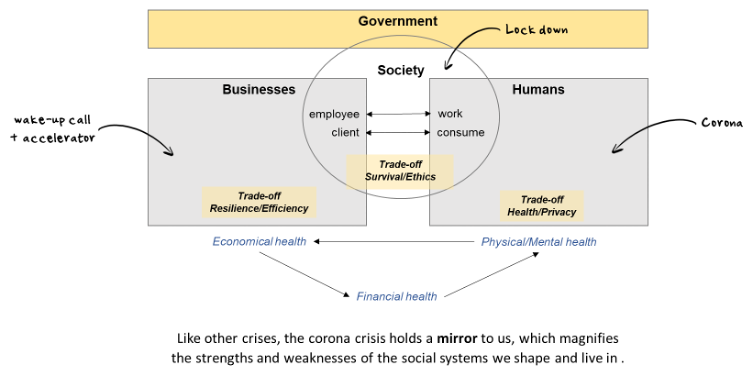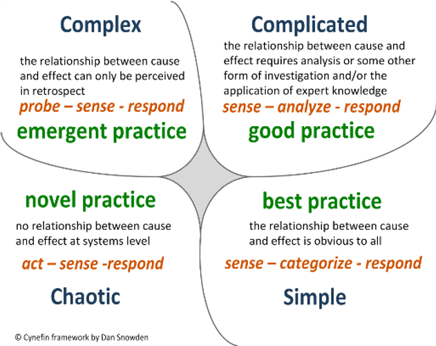
In the post-pandemic world, people and society will seek a new equilibrium. Even though we are unable to predict how this ‘next normal’ will impact businesses, that doesn’t mean we shouldn't prepare for it.
Prediction is difficult, especially if it’s about the future (Niels Bohr)
The coronacrisis magnifies strengths and weaknesses across the board. It may have a purifying effect if companies grasp this moment to revisit their strategy, invest in the capability to change and accelerate digital business with human technology. In other words, a new era has begun: the era of transformational excellence.
In this #AENextNormal blog series, we'll discuss how people and society will seek a new equilibrium and what companies will need to undertake to navigate out of the crisis and find their new position in the 'next normal'.
In this blog, we'll zoom in on the new post-pandemic equilibrium.
A New Equilibrium
The coronavirus outbreak has hit people and families unexpectedly and unexpectedly hard. In order to protect public health, governments have taken drastic measures. These measures not only abruptly confronted organizations and families with operational challenges, but also largely paralyzed the economy. Families and companies that have not built up sufficient reserves will eventually run into financial difficulties. The call for relaxation of measures is therefore strong.
People and society will seek a new equilibrium in the post-pandemic world. In this highly dynamic environment, full of unknowns, companies need to navigate out of the crisis and find their new position. They need to adapt, optimize, grow and possibly even reinvent their business in order to stay relevant for shareholders, customers and employees.
To prepare for the future, companies will need to develop a sense of empathy to anticipate how people will change behavior and how governments will change regulations.

People will live, work and consume differently
Social distancing implied practical (and financial) considerations in many households. It also gave the opportunity to take some distance … mentally. People started reflecting about their unquestioned daily routines and they rediscovered long-forgotten values:
- Health before wealth;
- Happiness is enjoying what you have rather than seeking what you don’t have;
- Individual freedom is bounded by the responsibility for all;
- People can change their behavior from one day to another (in case of urgencies, when danger comes fast and comes close).
Taking some distance allows for putting things in perspective and to see things with the right proportions. So, in the next normal, people will live, work and consume differently. They will recalibrate their lives.
- How much privacy will people want to sacrifice for health?
- How much are people prepared to sacrifice now (and for how long) for the sake of long-term benefits?
- How will we reorganize our work/life balance?
The answers to these questions will determine how people will behave as employee and as consumer.
Companies will need creativity and innovative thinking to overcome dilemmas:
- Flexible work is here to stay. But time and place independent work also causes mental and social alienation.
- Sharing economy is an answer to over-consumption. Unfortunately, public transport and rental solutions aren’t the most hygienic.
Society – a new contract between individual and group is in the making
We haven’t heard the last word about the corona measures yet.
“40 million is the calculated amount of people that would die from corona without taking the counter measure of lockdown. 130 million is the calculated amount of people that will die from starvation due to the economic and financial ripple effects of the lockdown.” (De Standaard 2nd May)
At first glance individual freedom (mobility) has been sacrificed -temporarily- for the common good (public health). People had to take their responsibility to not contaminate others. But the real question is about solidarity: who will pay for the longer term (and for some lasting) effects of these measures?
We clearly need an ethical reveille and solidarity between classes (rich, poor), between countries (developed, underdeveloped) and across generations (young, old).
Governments will have to repartition the conditions for wellbeing and welfare, leading to a more regulated economy.
- To protect the stakes of all, the unlimited individual rights of the happy few will be tempered.
- To pay the corona bill, tax and social security systems will probably need to undergo revisions.
- To discourage unethical behavior, fraud detection and prevention will become priority.
Governments also will have to stimulate economic revival:
- Policies for flexible and new ways of work
- Safety net for people and companies in financial turmoil
- Subsidies for innovation, education and science
While governments define the rules and the playing field, it will be companies that will shape the eventual balance between health, economy and ecology. As these domains have complex interrelationships, it is key to grasp the internal dynamics with a probe-sense-respond approach (Cynefin framework).
Companies will need to think holistically to consider all perspectives and to act pragmatically based on empirical observation rather than intellectual reasoning.
Embrace the Next Normal
To navigate out of the current crisis and accelerate towards your future, you'll have to embrace the Next Normal. Grasp this moment to revisit your strategy, invest in the capability to change and accelerate digital business with human technology.
Working on the necessary changes can feel overwhelming at times, especially if you have tons of ambitions but are limited because of outdated systems. To help you walk this tightrope between ambition and reality, check out our webinar with Jan Somers.
Are you ready to flourish in the era of transformational excellence? We'd love to discuss where we can be of help! Don't hesitate to contact us.





